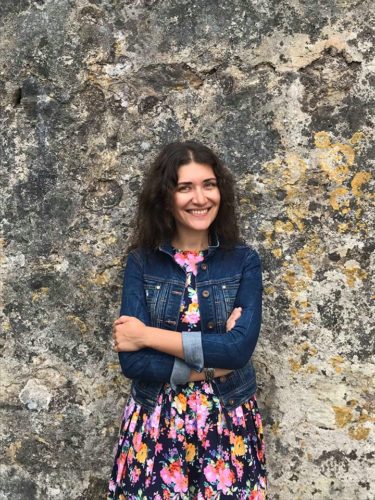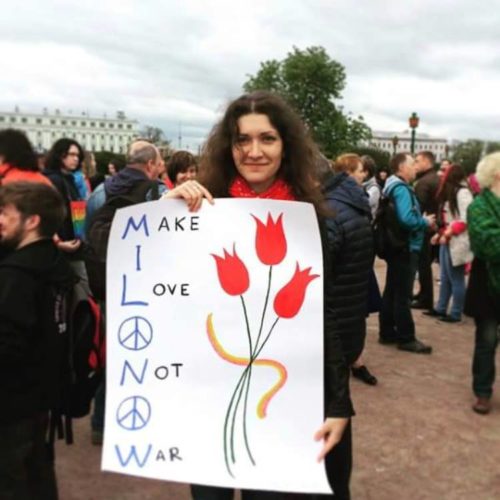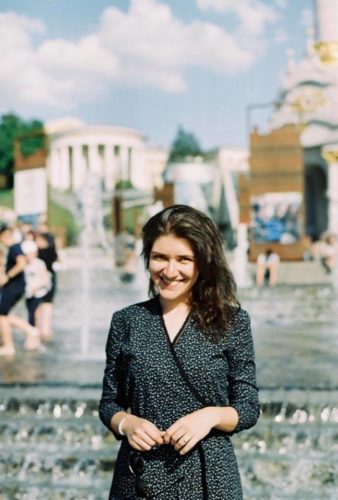After our Outober special, we are returning with our regular interviews. Our guest, however, is not regular. Meet Kseniya, originally from Siberia, now co-organizer of the European Lesbian* Conference, the biggest gathering of our community in Europe.
Hi, Kseniya. Can you tell us a little bit about yourself please?
My name is Kseniya. I am originally from Siberia, Russia, but I've spent quite a lot of time in Saint Petersburg; currently I live in Geneva, Switzerland, and my other home is Kyiv, Ukraine. I am a lawyer, a feminist, a human rights defender, and I have been involved in LGBTI activism since 2006. I am a Senior Programme Officer on Women and UN Advocacy with ILGA World, and also a Board Member of the European Lesbian* Conference. And I am passionate about literature, art, queer tango and travelling.

You are a true world citizen, it seems to me. Let’s talk about Russia, your native land now. What’s the general situation of the LGBTQ+ community over there?
Generally, it is difficult to be an LGBTQ+ person in the today’s Russia. The situation changed drastically in the last decade. Imagine, for example, that in the 2000s there were talk shows in prime time on the main TV channels where same-sex relations were discussed, and the worse comments were like “Well, for me personally that’s probably does not seem normal, but we all should peacefully live together.” In sharp contrast to that, this year a university newspaper issue in my hometown was banned for “propaganda of non-traditional sexual relations” just because it included some stories of LGBT students about how it was for them to be LGBT.
There are totally no laws in Russia that would explicitly protect LGBTQ+ people. Moreover, in the last years new restrictive and discriminatory laws have been adopted: for example, laws on “propaganda of non-traditional sexual relations” or laws banning adoption by same-sex married couples (if they are married abroad of course, as there is no recognition for same-sex unions in Russia itself).
As for everyday life, many of the LGBT, especially lesbian, teachers were harassed and lost their jobs in the past decade and only a very few of them challenged the dismissals in courts (and there was not a single positive decision after all). It became literally impossible to work officially on human rights in general, but particularly on LGBTQ+ human rights. I don’t think that any LGBT NGOs remained registered officially in Russia. And in most cases, it is impossible to hold a public demonstration – either because you will be banned by authorities, or because you will be attacked by LGBT-phobic crowd, or both.
Would it be the same across Russia?
No, of course, the situation is different in different regions. Persecutions against gay men in Chechnya became widely known, for instance. But in fact LBQ women were, and still are, suffering as well over there.
Another side, or consequence, of all these processes was that LGBT activists, groups and informal organisations became more active and stronger, and get support from the mainstream civil society. Even in such terrible circumstances, my colleagues managed not only to survive, but also to continue providing support to the communities, to run LGBT family support groups, to cover intersectional forms of discrimination, such as those faced by LGBT persons with disabilities, to establish new groups, to obtain new trans-related regulations, etc. And – finally – to start working specifically with LBQ women!

That’s very good news! Can you say a bit more about other regions, and specific cities in Russia?
From what I’ve seen, in Saint Petersburg where I have lived for four years LGBTQ+ people are more visible on the street, are more active in the public life, and there are in general much more opportunities for LGBTQ+ activism and recreation. There are several groups there, both general LGBT, and trans specific, for example. There are support groups for LGBT families and for parents of LGBT people; there are queer tango clubs, cultural festivals, etc. And I would also add that with all this hate propaganda LGBT people became much more identifiable by others. I remember very well this literally tangible sensation as you are being tracked in a subway, for instance.
At the same time, in Novosibirsk, my hometown, the situation is different. There are very few activists, they do not have enough resources, they are mostly volunteers, and there are no well-established festivals or support services. And in general, I would say, LGBTQ+ issues are not as politically charged there either as they are in Saint Petersburg.

What about lesbian* social life?
We never really had Pride in that sense the LGBTQ+ of Western Europe or North America have in mind. But there are a couple of wonderful festivals; there are clubs (mostly gay or mixed clubs) and parties in big cities.
But – surprise, surprise – almost nothing for lesbian women particularly, with very few exceptions. I recently realized that being a lesbian woman who worked with LGBT organisations for years and delivered services to the communities, I myself did not have enough opportunities to develop and support my own identity through the community services, no even in Saint Petersburg, the second capital of Russia (not to mention smaller localities). I do not remember any support groups particularly for LBQ women, any wide discussions on the role of lesbian women and LBQ women in the movement. I do not think we had any sexual and reproductive health information or contacts of friendly doctors known for lesbian communities.
For that reason, it is so crucial for me now to be a part of the European Lesbian* Conference, because what we are doing there is reclaiming our voice, rebuilding our identity and forming our own supportive space. And I am doing now something that is important for me, not for others. Changing and transforming rather than serving.

